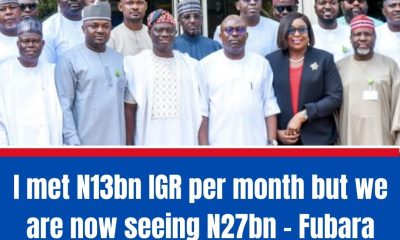Business
Breather for ailing economy as Dangote Refinery begins operation

The Dangote Refinery is widely expected to trigger activities that may see the struggling Nigerian economy begin recovery from years of almost total dependence on import of petroleum products and associated depletion of foreign reserves among other woes.
It is no longer news that the estimated $19 billion 650,000 barrels per day facility established by Africa’s richest man, Aliko Dangote, is scheduled to be inaugurated by President Mohammadu Buhari on May 22.
Before now, the project had suffered several setbacks in terms of completion date, especially due to some issues ranging from funding challenges, problems of importing steel and other equipment, the Coronavirus pandemic among others.
“Efforts by the Federal Government to make Nigeria self-sufficient in local refining of crude oil to save the scarce foreign exchange used in the importation of petroleum products have received a boost as the 650,000 barrels per day Dangote Refinery, the world’s largest single-train refinery, is set for inauguration on May 22, 2023, by President Muhammadu Buhari,” a presidential aide, Bashir Ahmad, had tweeted on Monday May 8.

Located in the Lekki Free Zone area of Lagos, the Dangote Refinery complex, covering a land area of approximately 2,635 hectares, which is larger than the size of Victoria Island in Lagos, is the biggest refinery in Africa and the biggest single-train refinery in the world.
A single-train refinery uses an integrated distillation unit or one Crude Distillation Unit (CDU) to refine crude oil into various petroleum products, as against the use of multiple distillation units by most big refineries.
Due to the large capacity of the plant, its pipeline infrastructure is the largest anywhere in the world, with 1,100 kilometres to handle three billion Standard Cubic Feet per day (Scf/d) of gas.
The company, on its website, said the refinery would meet 100 per cent of the Nigerian requirement of all refined products and also have a surplus of each of these products for export. The facility is designed to process both Nigerian crude and other crude.
“Dangote Petroleum Refinery is a multi-billion dollar project that will create a market for $21bn per annum of Nigerian crude. It is designed to process Nigerian crude with the ability to also process other crude,” the firm stated.
Meanwhile, industry operators, government officials and other stakeholders have expressed optimism that the refinery will bring about humongous benefits not just to the oil and gas sector, but to the Nigerian economy at large.
The operators see in the facility one of the key drivers of growth that would impact positively on the downstream sector of the Nigerian and African economy from this year.
They expect the refinery to save Nigeria billions of naira, based on the fact that import of Premium Motor Spirit, otherwise known as, petrol into the country would cease, going by the refining capacity of the plant.
Saving and generating FX
The President of Dangote Group, Aliko Dangote, said with the planned commencement of the refinery, Nigeria could save up to $10 billion in foreign exchange (FX) and generate another $10 billion in exports.
Dangote spoke in an interview with a special edition of London-based The Economists Magazine, titled ‘The World Ahead 2023,’ which was unveiled with considerable focus on West Africa and aimed to highlight the potential as well as areas for improvement in Africa.
Expressing his views on expectations for the creation of value-added industries in Africa, the richest black man in the world stated that Nigeria’s economy as presently constituted has largely been built around the extraction and exportation of its natural wealth.
He noted that as a major oil producer, Nigeria currently imports over 90 per cent of its refined petroleum products, which amounted to roughly $10 billion in imports in 2022.
According to Dangote, while this has brought major benefits to many businesses, more prosperity could be created by locally refining Nigeria’s resources.
“The refinery’s completion will not only create direct and indirect jobs, but will also lead to skills transfer and technology acquisition opportunities that will benefit the downstream sector,” he said.
“Moreover, the refinery’s production of critical products like naphtha and polypropylene will stimulate the development of other industries, such as cosmetics, plastics, and textiles. Refineries on this scale could save Nigeria up to $10 billion in foreign exchange and generate approximately $10 billion from exports.’’
Cost saving
The Group Chief Executive Officer of Nigerian National Petroleum Company Limited (NNPCL), Mele Kyari, had explained in February that the refining of crude oil into PMS in Nigeria would compress the logistics cost around petrol supply by about N17/litre, describing this as significant.
Currently, NNPCL supplies over 60 million litres of petrol daily to keep Nigeria wet with the product. A N17/litre reduction in logistics cost would translate to N1.02bn savings daily. Based on this, the country would be saving over N367bn annually when Dangote Refinery becomes operational.
Kyari, who was speaking during a programme on Nigeria Television Authority, also stated that efforts were ongoing to get the Port Harcourt and Warri refineries ready in the first half of this year.
He, however, pointed out that though there would be some gains in price with respect to logistics, the local refining of crude would not warrant a massive crash in the cost of petrol.
“This understanding that once you start local refining prices will crash, this is not so. It is very unlikely to play out that way because firstly, crude oil will continue to be the major feedstock for every refinery; 70 per cent of your operation cost always comes from crude, as your feedstock, and this is priced at the international market,” Kyari had explained.
“However, two things will change when we start local refining. It gives you the security of supply. Now, when you place an order, it takes you 14 days to get these products from Europe into our country and that can be a matter of concern.
“Any glitch with weather, war situation, or something happens, you will run into trouble, but once you are producing locally, the products become very close to you and the issue of energy security becomes much more assured.”
According to him, the in-country refining of crude “reduces the logistics cost, because for you to move products from Europe to Nigeria, probably it is going to cost you about N21/litre today. But when you bring it closer home, you are probably going to need N7 or N8/litre to move it from one location, all things being equal.
“So, it is going to compress your price in today’s context, maybe by N17 or so, and that N17 is quite significant. But more than anything, it gives you the security of supply because these products will be closer.”

NNPCL has 20 per cent stake in the Dangote Refinery.
For a former CEO of Access Bank Plc, Aigboje Aig-Imoukhuede, though the commencement of operations of the Dangote Refinery might not alter the global price of crude, there might be a drop in the transportation component of petroleum products once the refinery begins operations.
Speaking in Abuja recently, Aig-Imuokhuede, who is currently the Chairman of Coronation Capital, explained that the Dangote Refinery would operate as an international entity and that concerns around fuel subsidy had nothing to do with the facility.
“Let me explain something, because I understand how the politics and economics of subsidy in Nigeria work. The decision to have fuel subsidy in Nigeria is not grounded in any economic thinking. It is a purely political one,” Aig-Imoukhuede stated.
“So, from an economic standpoint, you now have the ability to refine 650,000 barrels of crude per day in Nigeria once that refinery is commissioned. As to whether or not it is going to mean that you can remove fuel subsidy, the first question should be, will Nigeria give Dangote subsidised crude oil? At what price will Nigeria give Dangote crude oil?
“So, if you want to continue with fuel subsidy, the only way that the Dangote Refinery is going to be able to generate fuel at sub-international market price is if you gave Dangote subsidised crude oil. Now, Dangote is not asking for subsidised crude oil, neither are Nigerians asking for subsidised crude oil.”
Monopoly concerns
Also speaking, the Secretary, Independent Petroleum Marketers Association of Nigeria (IPMAN), Abuja-Suleja, Mohammed Shuaibu, stated that it was obvious that the Federal Government was waiting for the Dangote Refinery to come on stream. This, he said, was one of the reasons the government had not put the desired effort to revamp Nigeria’s refineries.
“The government is waiting for Dangote Refinery, and that shows you how important that facility is to Nigeria’s petroleum products’ demands,” he stated.
Shuaibu, however, stated that the refinery might become a monopoly, since the country’s refineries in Kaduna, Port Harcourt and Warri have remained dormant for decades, despite repeated promises by the government of revamping them.
The Dangote Refinery is a welcome project and there is no doubt that it is going to improve products’ supply once it starts operations, both in Nigeria, Africa and globally.
“But the truth is that once that refinery comes on stream, it is going to operate as a monopoly. Of course, when there is no competition, what do you expect? Another thing is that while he sells to Nigeria, he will also focus on the international market,” the IPMAN official stated.
Ready to buy
The Executive Security, Major Oil Marketers Association of Nigeria (MOMAN) said they were anxious to buy products from the Dangote refinery, as the association has commenced discussions with the refinery’s management.
Of course, we are very happy. We will be very happy to buy petrol from them (Dangote). We have been talking to them. We can’t wait for them to start. We will buy from them as soon as they start,” he said.
Similarly, IPMAN said the refinery will quicken Nigeria’s crave for full deregulation of the petroleum sector.
Speaking in a monitored interview, the association’s National Vice President, Alhaji Abubakar Maigandi, described the coming on stream of the refinery as good news.
Maigandi said: “It is a very good and welcome development. It will help the deregulation that the government is about to do. Yes, we too are planning to start buying from him when he starts. When the sector is fully deregulated, IPMAN too will buy product from Dangote.”
Meanwhile, the Nigerian Association of Road Transport Owners (NARTO) has said it planned to seek funding for truck procurement from either the Federal Government or private sector to scale up its operation to match the demand for petroleum products haulage from the Dangote Refinery.
NARTO President, Alhaji Yusuf Lawal Othman, said: “I am sure that we are going to look for financing of trucks either from the Federal Government or any other person so that we will have smooth operation. So, we are very happy.”
-

 Sports6 days ago
Sports6 days agoFA Cup: Man Utd suffer fresh triple injury blow ahead Coventry clash
-

 Business5 days ago
Business5 days agoI met N13bn IGR per month but we are now seeing N27bn – Fubara
-

 News6 days ago
News6 days agoDespite Apology, ABU Zaria Final-Year Law Student Arrested For Defaming Police Officer On Facebook
-

 Politics6 days ago
Politics6 days agoSERAP To Govs, Wike: Account For Trillions Of FAAC Allocations
-

 News4 days ago
News4 days agoCourt orders Becky Buodeigha alias Becky Minaj, CEO of BM Secrets to pay Baraza N7m
-

 Politics6 days ago
Politics6 days ago‘Ondo APC Guber Primary Result already written’ — Aspirant cries out, demands postponement
-

 Business6 days ago
Business6 days agoInvest in Bayelsa, Governor Diri tells Elders, leaders of the state
-

 Politics4 days ago
Politics4 days agoEFCC: I am Ready to Appear in Court But Afraid of Arrest – Yahaya Bello




















